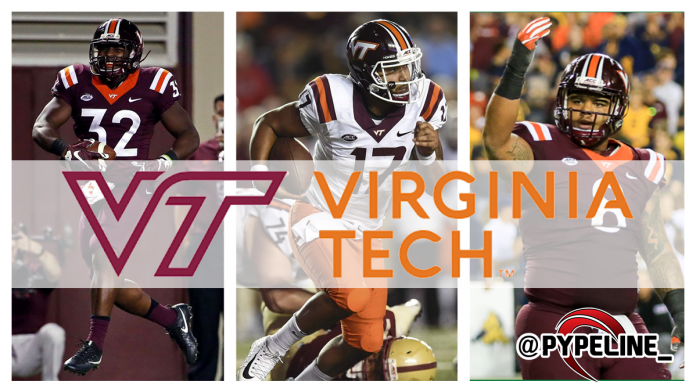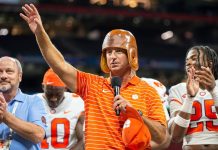In his first two seasons as head coach of Virginia Tech, Justin Fuente has retooled the Virginia Tech football program into the ACC Coastal Division power it once was, winning nineteen games in his first two seasons in Blacksburg. The first year saw an offense that burgeoned in the second month of the season, led by quarterback Jerod Evans and several NFL-caliber receivers. After several early departures for the NFL Draft, the Hokies turned to their defense to lead the way the following season. By almost any metric, they were among the most stout units in the country. But challenges still remain.
The Hokies were and remain young on the offensive side of the ball, while the defense has seen tremendous personnel loss. In what has become a tumultuous offseason, Fuente and defensive coordinator Bud Foster now have their work cut out for them to produce a winner in 2018. If the last 24 years of Hokie football are any indication, it may signal a return to the hard-nosed, Lunch Pail mentality of Tech teams of old.
Offense
It was well known in Virginia Tech circles that the offense would experience some growing pains in 2017, and they did. Following the conclusion of the 2016 season, then-starting quarterback Jerod Evans announced he would forego his final year of eligibility and declare for the NFL Draft, much to the shock of Hokie fans and even coaches. Junior wideouts Bucky Hodges and Isaiah Ford did the same, and it left a gaping hole at two of the most important positions on the offense. It started out fine, as the team averaged 37 points per game in their first seven contests. But the production fell off a cliff in November, as the Hokies averaged just 15.5 points in four games. The good news? They can only get better.

Quarterbacks
In 2019 and beyond, the question of who the Hokies signal-caller will be is unclear. In 2018, this is Josh Jackson’s team. All things considered, Jackson had a great freshman season for Virginia Tech last year. He started all 13 games and threw for 2,991 yards while completing almost 60% of his passes with 20 touchdowns and just nine picks, to go along with six rushing TDs. He led his team to a dramatic 31-24 opening-night win over West Virginia, accounting for two scores, and threw for over 320 yards on two occasions.
But there were some struggles, too. In the final five games of the season, Jackson completed just 54% of his throws, had a 4/5 TD/INT ratio, and averaged just 2.4 yards per carry. This was partly because of injuries and poor offensive line play (which certainly impacted the rushing totals), but Jackson got into the habit of missing receivers and overthrowing balls. In addition, he seemed to lack the explosive speed of his predecessor Evans, and often struggled to escape collapsing pockets or breakaway from defenders.
The biggest scare came just several weeks ago, when it was rumored that Jackson was suspended by the team for academic wrongdoing. This turned out to be untrue, and Jackson was promptly cleared and returned to team activities. However, it brought worry to Virginia Tech players and fans alike. If the team is to have much success this year, it will have to be with a healthy, focused Josh Jackson on the field.
Offensive Line
The Hokies will have to rebuild on the O-Line, as they lose mainstays Wyatt Teller and Eric Gallo at left guard and center, respectively. Left tackle Yosuah Nijman (6’7, 322 lbs.) missed the final five games of 2017 due to injury. Assuming he is healthy, he will be extremely valuable for the passing game. Sixth-year senior Kyle Chung will move from right tackle to center. Expect to see junior D’Andre Plantin and sophomore Zachariah Hoyt to see time at tackle. Like many units on this Hokie squad, the offensive line is a question mark more than anything else. Expect them to be good, but not great.
Wide Receivers
This is where Virginia Tech needs its young players who saw time last fall to take a bigger leap in 2018. Cam Phillips, who led the team with 964 receiving yards despite playing in only 12 games, graduated. The next leading receiver, freshman Sean Savoy, had 454 yards, averaging 11.6 per catch. Tech is still trying to figure out who their #1 target will be, and it could be Savoy, but he must correct his tendency to drop balls. Shifty senior C.J. Carroll and red-zone TE Chris Cunningham (Jr.) are the veterans of the bunch. But they will be relied on for leadership more than anything else, as Tech is looking at younger players to carry the load. Junior Eric Kumah (342 yards, 2 TD) and sophomore Hezekiah Grimsley (139 yards), along with Savoy, may be those guys.

Running Backs
For the past several seasons in Blacksburg, it was Travon McMillian who shouldered the load at running back. But due to a lack of carries his junior year, McMillian transferred to Colorado in the spring semester. Now, the Hokies will look elsewhere. It may start with rising junior Deshawn McClease. He led the team with 530 rushing yards a season ago, plus three touchdowns. Senior Steven Peoples is a bulky 5’9 and 220 lbs. However, he isn’t quite a high-volume runner and struggled with injuries last season. McClease should see most of the carries in 2017. But Fuente is known for his “running back by committee” system. Last year, eight different players rushed the ball 19 or more times. This includes the quarterback Jackson, who hopefully can become more productive as a runner his sophomore campaign.
Defense

Defensive Line
There have been many areas of the Virginia Tech defense hit by personnel loss over the past several months, but the defensive line is least among them. The only loss was tackle Tim Settle (6’3, 335 lbs). Settle was a redshirt sophomore who surprisingly declared for the draft. The Washington Redskins selected him in the 6th round. But the team returns four-year starter Vinny Mihota, junior defensive end Trevon Hill, and senior DT Ricky Walker. Hill had 46 tackles and 5.5 sacks, while Walker recorded 41 tackles and 4.5 sacks, each statistic the best among all Hokies defensive linemen.
Linebackers
This is where longtime defensive coordinator Bud Foster will have to pull some tricks up his sleeve. Starting LB Andrew Motuapuaka graduated. After Tremaine Edmunds skipped his senior year to go pro, the Buffalo Bills selected him in the first round. (Note – his brother, safety Terrell Edmunds, did the same, and also went in the first round.) Tremaine was a do-it-all star that any powerhouse program would have a tough time replacing, let alone a blue-collar school like Virginia Tech. Also, whip linebacker Mook Reynolds was dismissed from the team, due to a felony charge.
As such, the Hokies must turn to their youth. Four-star recruit Dax Hollifield (who chose Tech over Clemson, among others) is the prize of the 2018 recruiting class and should see time right away. Dylan Rivers and Rayshard Ashby, both sophomores with 0 career starts, are projected to be in the mix for a starting position come September. Rivers appeared in limited action a year ago, while Ashby saw time only on special teams. This linebacking unit is going to be very inexperienced. Down the road, this group will be a force to reckon with. But for now, there are some serious questions marks. That being sad, there’s a reason Bud Foster has been employed for nearly 30 years. He knows how to make more from less.

Secondary
Gone are talented corners Greg Stroman and Brandon Facyson, along with the aforementioned safety Terrell Edmunds. Rising senior Adonis Alexander was dismissed from the team due to academic issues. Projected starting CB Jeremy Webb is out for the year with a torn ACL. Like many other units on this squad, it’s next man up. Safeties Reggie Floyd (Jr.) and Divine Deablo (R-So.) are returning. Floyd had three interceptions last year, second-most on the team behind Stroman. Deablo is a tremendous athlete, and recorded a pick and three breakups in just four games as a sophomore. However, he broke his foot in September. That has slowed his progress this spring, and it will be interesting to see how fresh he is for a return.
Sophomore Devon Hunter is an interesting story. Coming out of high school, he was a 5-star recruit and ranked the top safety in the state of Virginia. Then he dealt with multiple injuries. As a result, he morphed from a prized blue-chip into more of a quiet utility type. He could see time at safety or even linebacker. Redshirt freshman Caleb Farley should hop into the mix at corner, along with sophomores Bryce Watts and Khalil Ladler. Youth on the Virginia Tech defense: what’s new?
Prediction for 2018
From the fan’s perspective, Virginia Tech has a great schedule for 2018. They start the year with a primetime matchup at Florida State on Sep. 3, and host powers Notre Dame (Oct. 6), and Miami (Nov. 17), as well as a Thursday night game versus Georgia Tech (Oct. 25). The good news for the Hokies is that the rest of the ACC Coastal projects to be pretty mediocre, if not bad. Duke is retooling and UNC is rebuilding. Georgia Tech is a threat with the triple-option, but has always lacked elite talent. UVA is, well, UVA.
The Hokies are in an interesting position: they return most of the offense, which underperformed a year ago. However, they lost most of the defense, which was their strength. If they take care of inferior FCS/Group of 5 competition, and hope that their ACC rivals have down years, they can compete for a Top-15 ranking and a Coastal Division crown. If the offense goes sour and the youthful defense is overwhelmed, it could be different.
Prediction: 8-4 (5-3 ACC), 2nd in Coastal Division






